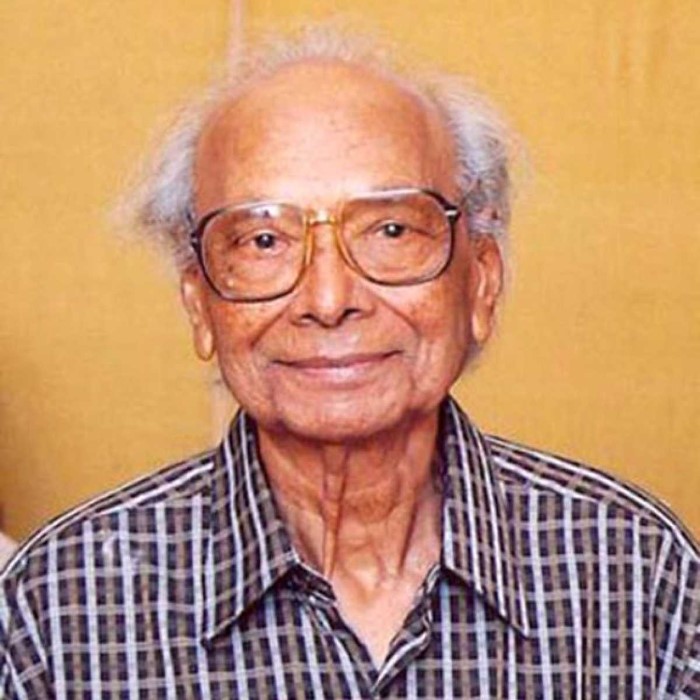Members
1
Origin
 India
India
Genre
---
Style
---
Mood
---
Born
1
Origin
Genre
---
Style
---
Mood
---
Born
1919
Active ---Present...
Cutout![]()
No loved tracks found...
Artist Biography
Available in:
Naushad Ali (25 December 1919 – 5 May 2006) was an Indian music director for Hindi films. He is widely considered to be one of the greatest and foremost music directors of the Hindi film industry. He is particularly known for popularising the use of classical music in films.
In Mumbai, he initially stayed with an acquaintance from Lucknow (U.P.) at Colaba and after a while, shifted to Dadar opposite the Broadway theatre where he would sleep on the footpath. He assisted music director Ustad Jhande Khan who was at the peak of his success those days, at a monthly salary of Rs 40.
Then he worked on a film where the producer was a Russian and the studio was at Chembur. This film could not be completed. Naushad was a piano player so he worked as a pianist in composer Ustad Mushtaq Hussain's orchestra. He then polished off an unfinished film score and got a credit as assistant to Mushtaq Hussain. Then the film company collapsed. Composer Khemchand Prakash took him on as his assistant for the film Kanchan at Ranjit Studios at a salary of Rs 60 per month, for which Naushad remained extremely grateful and in interviews, he had called Khemchand his guru.
His friend, lyricist D. N. Madhok, trusted Naushad's unusual talent for composing music and introduced him to various film producers. Chandulal Shah, the owner of Ranjit Studios, offered to sign Naushad for one of his forthcoming films. Naushad composed a thumri for this film, "Bata de koi kaun gali gaye Shyam", but the film never got on the floors. He was assistant music director for the Punjabi film Mirza Sahib (1939).
He composed for his first independent film Prem Nagar in 1940 that had a story set in Kutch for which he did a lot of research into the folk music of the area. With A.R. Kardar's film Nayi Duniya (1942), he got first credit as "music director" and he began to work regularly for Kardar Productions. He, however, had a flexibility that he could work outside Kardar Productions and this arrangement continued throughout his career. He first got noticed with A.R. Kardar's film Sharda (1942) wherein 13-year-old Suraiya debuted with the song "Panchhi Ja" for the playback for heroine Mehtab. It was Rattan (1944) that took Naushad right to the top and enabled him to charge Rs 25,000 a film during those days.
Film expert and author Rajesh Subramanian opines that Kardar productions spent Rupees seventy five thousand in 1944 to make Rattan. The music by Naushad saheb was such a phenomenal hit that the company earned Rs 3 lacs as royalty from gramophone sales in the first year.
But his Lucknow-based family remained against music and Naushad had to hide from his family the fact that he composed music. When Naushad got married, the band was playing the tunes of the super hit songs of Naushad's film 'Rattan'. While Naushad's father and father-in-law were condemning the musician who had composed these songs, Naushad dared not tell them that it was he who had composed the music. Naushad understood Hindu and Muslim culture and the languages of those cultures.
From 1942 until the late 1960s, he was one of the top music directors in Hindi films. While he did 65 films during his lifetime, 26 of those films celebrated Silver jubilees (25 weeks run) – 8 celebrated golden jubilees (50 weeks run) and 4 celebrated diamond jubilees (60 weeks run) – (inclusive count – a diamond jubilee film also celebrates Silver and Golden jubilees).
Naushad worked with several lyricists, including Shakeel Badayuni, Majrooh Sultanpuri, D. N. Madhok, Zia Sarhadi, Yusufali Kechery and Khumar Barabankvi.
Mother India (1957), for which he had composed music, was the first Indian film that got nominated for an Oscar award.
In 1981, Naushad was awarded the Dadasaheb Phalke Award for his lifetime contribution to Indian cinema.
He composed the tunes of Taj Mahal: An Eternal Love Story (2005) at the age of 86.
Amongst his assistants, Mohammed Shafi, Jerry Amaldev and Ghulam Mohammed (composer) stand out prominently.
The songs Naushad composed for the 1988 Malayalam film Dhwani which were sung by P. Suseela & K. J. Yesudas are evergreen superhits that Malayalis do repeatedly listen to even after 3 decades.
Five films have been made on his life and work. Biographical books published are Dastaan-E-Naushad (Marathi) by Shashikant Kinikar; Aaj Gaawat Man Mero (Gujarati); Hindi and Urdu biographical sketches in Shama & Sushma Magazines respectively, titled "Naushad Ki Kahani, Naushad Ki Zubani"; the last one was translated into Marathi by Shashikant Kinikar. Kinikar also came up with a book titled "Notes of Naushad" which puts together some interesting anecdotes of Naushad's life.
Naushad also composed background music for the TV serial "Akbar The Great" telecast in 1988 which was directed by Akbar Khan, brother of Hindi film stars Sanjay Khan and Feroze Khan as was also The Sword of Tipu Sultan produced and directed by Sanjay Khan and Akbar Khan which was telecast in 1990 and became very popular.
Wide Thumb
Clearart
Fanart


Banner
User Comments
 No comments yet..
No comments yet..